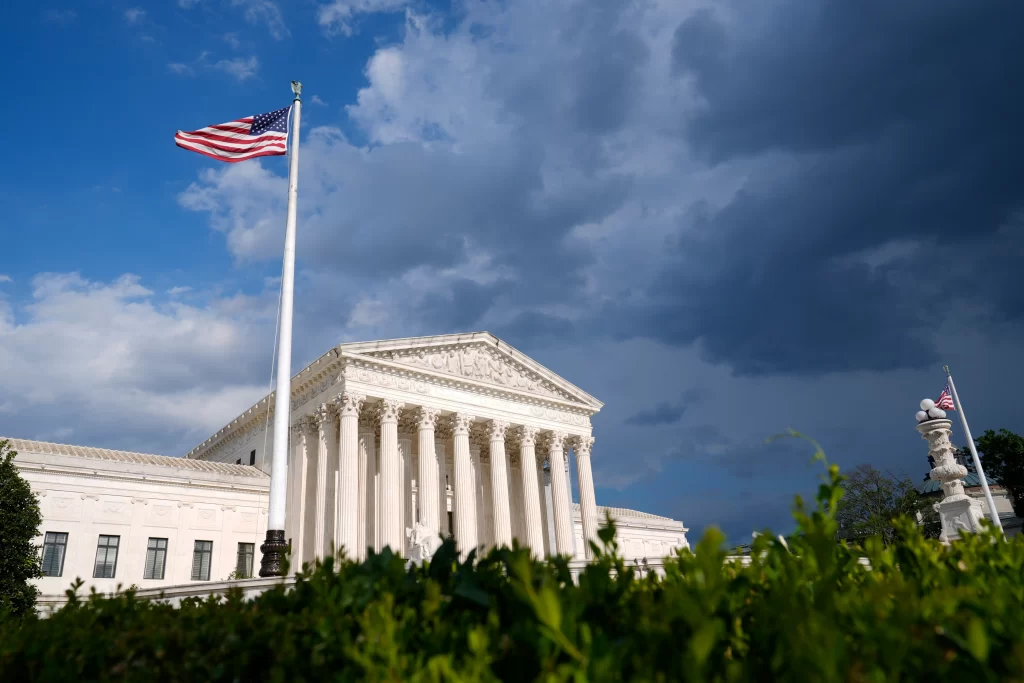
In a contentious decision, the Supreme Court has permitted Virginia to proceed with a program aimed at removing suspected noncitizens from its voter registration rolls. This ruling, which emerged just days before the upcoming election, aligns with Republican interests and marks a significant early move by the Court regarding electoral issues.
The decision was issued without a formal commentary from the majority of conservative justices, allowing the state to maintain its stance against around 1,600 voter registrations linked to individuals who self-identified as noncitizens. Liberal justices Sonia Sotomayor, Elena Kagan, and Ketanji Brown Jackson dissented, highlighting concerns over potential disenfranchisement of legitimate voters.
Supporters of the program, including former President Donald Trump, have labeled it a practical measure to safeguard electoral integrity, asserting that noncitizens should not be allowed to vote. However, this initiative has faced significant pushback from the Biden administration, voting rights advocates, and various lower courts, who argue that the process could inadvertently remove eligible citizens from the voter rolls.
Despite Virginia not being a battleground state, the issue has been politically charged. Republicans have long propagated unfounded claims regarding rampant noncitizen voting, which they often cite as a factor in Trump’s 2020 electoral loss. Data, however, shows that documented instances of noncitizen voting are exceedingly rare; for example, a recent audit in Georgia identified just 20 registered noncitizens, with only nine having actually cast a vote.
The controversy traces back to an executive order by Virginia Governor Glenn Youngkin, issued in August. This directive mandated election officials to intensify their efforts in matching voters who self-identified as noncitizens against Department of Motor Vehicles records and to remove those individuals from the voter rolls. Following the Supreme Court’s decision, Youngkin proclaimed it a victory for electoral fairness, assuring Virginians that their elections are now secure from politically driven disruptions.
Legal challenges arose when the Biden administration and voting rights organizations filed suit against Virginia’s actions. A US District Court ruled last week that the program might have wrongfully purged some eligible voters. Judge Patricia Tolliver Giles highlighted that the citizenship status of those purged was never conclusively verified, creating significant uncertainty about the legality of the removals.
Opponents of the program cited the National Voter Registration Act of 1993, which restricts states from enacting systematic changes to voter rolls within 90 days of a federal election. They argued that Youngkin’s order constituted exactly this type of systematic change. Conversely, Virginia contended that the restrictions only applied to eligible voters, thereby exempting those deemed noncitizens.
While previous court decisions did not prevent the state from assessing individual voter eligibility or removing noncitizens, they did emphasize the importance of ensuring that legitimate voters were not affected by these systematic changes.
In an emergency appeal to the Supreme Court, Virginia officials invoked a legal principle known as the “Purcell principle,” which discourages federal courts from altering voting regulations close to an election to avoid confusion. Virginia asserted that the federal district court’s halt of the program violated this principle. Meanwhile, voting rights advocates maintained that the federal law allowed for challenges against last-minute voting changes under such circumstances.
Virginia’s defense also referenced the state’s provision for same-day registration, suggesting that individuals whose registrations were wrongfully canceled could re-register at polling places by confirming their citizenship. Critics, however, argued that this solution would not alleviate the issues faced by voters who intended to vote absentee and were unaware of their canceled registrations. There were also concerns about the potential chaos at polling locations if poll workers were unprepared for the situation.
The lack of an explanation from the Supreme Court regarding its decision leaves the rationale behind the ruling open to interpretation, leaving many to speculate on which arguments resonated with the justices. As the election approaches, the implications of this ruling are sure to be felt, raising ongoing questions about the balance between electoral integrity and the protection of voter rights.







